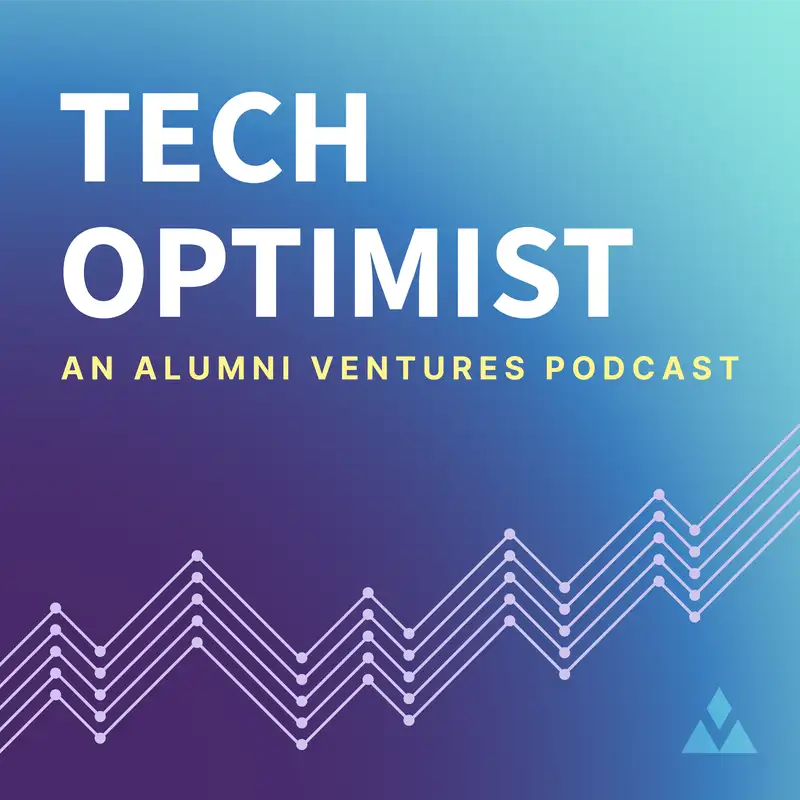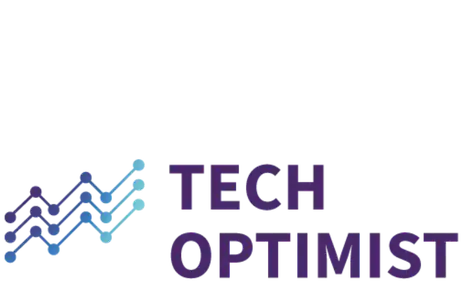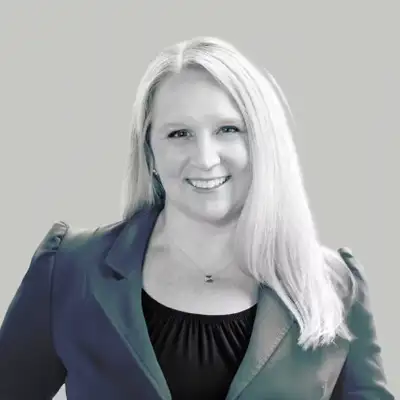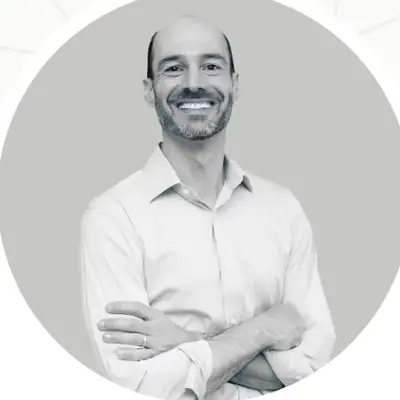#23 - Three Breakthroughs: Regulatory Pushback, Glassy Gels, and the Year of the Drone
Sam:
A strong and flexible plastic? Sounds like an oxymoron, but I assure you, it's real. Let's find out how. My name is Sam, and today I will be your guide. This is the Tech Optimist.
Mike Collins:
I think, in a way, this is the year of the drone.
Matt Caspari:
Now, as you're trying to combine some soft, squishy material with maybe something very rigid, even a metal, can you have one material come in and solve that?
Mike Collins:
Companies don't like being second-guessed when they make a decision. Seeing a huge amount of capital jump the fence to get into the private sector.
Sam:
In a world captivated by criticism, it's easy to overlook the groundbreaking technologies shaping our future. Let's shine a light on innovators who are propelling us forward.
As the most active venture capital firm in the U.S., we have an exceptional view of tech's real world impact. Join us as we explore, celebrate, and contribute to the stories of those creating tomorrow. Welcome to the Tech Optimist.
As a reminder, the Tech Optimist podcast is for the informational purposes only. It is not personalized advice and it is not an offer to buy or sell securities. For additional important details, please see the text description accompanying this episode.
Mike Collins:
All right. So, welcome to Alumni Ventures' Tech Optimist podcast, and our three breakthrough segment. And this is where we get together and talk about things in the news that we think have pretty profound potential and impact in the area of technology and science.
I'm Mike Collins. I'm the founder and CEO of Alumni Ventures. I'm joined today by Matt Caspari, one of our managing partners out in Menlo Park. Matt, welcome.
Matt Caspari:
Yeah. Good to see you, Mike.
Mike Collins:
I think I go first today. Right?
Matt Caspari:
Yeah. You're up. You're up. Kick us off. What do you have?
Mike Collins:
All right. So, mine is kind of a blend. I'm calling it kind of regulatory pushback. I think there was three things that are somewhat related, and the first is really the U.S. appeals court, which knocked down this SEC private equity oversight rule. And listen, I think, politics aside, this court is clearly sending bow shots to regulatory agencies about overreach.
Matt Caspari:
Yes.
Mike Collins:
And I think this has implications for venture capital and private equity. I think that's one. I think, we also are seeing kind of the second vote on the Elon Musk pay package passing.
Matt Caspari:
Yeah, that's an interesting one. Yeah.
Mike Collins:
Right? This was, Delaware since forever, basically, has been the place where companies would domicile and set up. It was kind of the default. And it was always kind of, hey, there's 100-plus years of case law and companies can feel pretty safe.
Matt Caspari:
Yeah. My first startup, when we raised our Series A, we reincorporated from California to Delaware for just that reason.
Mike Collins:
Yeah. Right. It's kind of-
Matt Caspari:
It's just the standard, it's what you do. Yeah.
Mike Collins:
What you do. Right?
Sam:
So, Mike and Matt being the venture capital experts they are, they obviously know what it means and why certain startups would incorporate their companies in Delaware. But for other people, maybe some people like me or anyone else who's listening to the show, who doesn't know the advantages of reincorporating a company in the state of Delaware, here in the U.S., it's pretty advantageous. And I researched it and I'm going to tell you why.
So, Delaware is a popular choice for incorporating a business due to its business-friendly environment, tax advantages and legal system. Delaware doesn't have a corporate income tax for companies that don't operate within their state, therefore, you don't have to obviously live in Delaware to have your company incorporated within Delaware, which can be a huge advantage for some people who are in the startup space. And it also doesn't have a sales tax, inheritance tax or personal property tax, which also is huge.
Delaware has a specialized court that handles corporate law disputes, and the judges are known for their expertise. I guess, they're kind of legends within the startup space. And as far as privacy goes, businesses don't need to disclose the names of their officers and directors to the state. And as far as flexibility, there's no minimum capital requirement and the board of directors can set the price of shares, which also is huge and very personalized per company. And then lastly, speed. Apparently filings are processed quickly. And the Court of Chancery, which I mentioned earlier, is known for resolving these disputes quickly.
Yeah. Let's get back into Mike's breakthrough, but I figured this would be an important topic to explain before we kept going. So, take it away.
Mike Collins:
And I think there is buzz that people are taking a second look at that now. If you can have basically a judge come in and say, "We don't like what the board has decided and what the shareholders have voted for, that we view this for whatever reason, legitimate or not, we don't like it." Companies don't like being second-guessed when they make a decision. And then again, they're picking on the wrong guy and-
Matt Caspari:
They're picking on a guy who has some resources to fight this.
Mike Collins:
Has some resources and a bit of an F you attitude. So, they ran the vote again and it passed with a vast majority. And there were some groups that were kind of called on the carpet for, "Oh, you were okay before he made this incredibly lucrative, but long-shot benchmark."
Matt Caspari:
Amazingly long-shot deal. I mean, I remember when that came out, it's like, this is crazy.
Mike Collins:
It was a long-shot deal and everybody was cool with it. It's like, "You're not going to 10X the value." It's like, oh, then they did. And it's like, "Oh, now we don't want to pay you." That's not how one does business. So, for me, that was two.
And then, the trifecta, and it's not completely in the same camp, but I think it's related, which is the establishment of a new stock exchange coming, the Texas state version to compete with New York and the marketplaces, where I think there's some people that are saying, "Competition is good, and we don't like marketplaces doing more, getting out of their lane and telling us how we should do things." And so-
Matt Caspari:
Do you think that's an opportunity for venture-backed companies to get out earlier? I mean, I know, Nasdaq, New York Stock Exchange, ton of costs, ton of regulatory overhead. Do we think this Texas exchange could allow us to see venture-backed companies potentially getting out earlier? Is that something that interests you?
Mike Collins:
It definitely interests me. Again, this has been happening for 10 years. The cost and the hassle of being a public company has led most companies to say, "No, thanks. I will stay private as long as I can." That has, at the same time, seen a huge amount of capital jump the fence to get into the private sector. Right? And I think it's the cost. I think it is, frankly, a very short-term oriented perspective that the public market crucifies you with one bad quarter. It is not a long-term capital perspective. And so, again, sometimes good things take time. And either you have the resources and wherewithal to withstand that ... If you look at Amazon's journey over 15 years, they lost enormous percentage of their value multiple times, because they said, "We are going to make it a long-term investment." Which the market didn't appreciate.
So, they were able to withstand it and come out on top, if you will, but many, many companies can't. And so, there's a reason that well-informed, rational CEOs prefer to stay private. And you're seeing innovation among private companies to provide liquidity to early investors and shareholders. And I think two things need to happen. The cost of going public needs to come down. Investors need to have a longer term perspective, or companies will continue to stay private. I mean, in founding my company, and I'm a venture capitalist, from the very get go, I said, "I want to build something over 20 or 30 years. I'm not going to raise venture capital, which has a fuse. And I have no plans to go public because we want to make investments that may not pan out, and at the very least, may take 3, 5, 7 years of hard, grindy work to achieve."
So, I am optimistic, though, that more competition is always good. So, I am excited about companies going public in London. I'm excited about this new exchange. I think, clearly, SpaceX or one of Elon's companies is going to get listed on there. I think people thinking about incorporating in other states, Nevada, Texas-
Matt Caspari:
Yeah. Texas. Yeah.
Mike Collins:
... I know those are being talked about left and right, and I think it's all good. I think that makes people that have monopolies get their act together. And I think you've seen that with Google in a whole different realm, which is it took OpenAI and ChatGPT for them to get going on huge AI assets that they had in-house. The market works, competition works. Sharpen your blade. So, that's one.
Matt Caspari:
Great. Okay. That's a good start.
Mike Collins:
I'm calling it the bureaucracy regulatory backlash. What do you got?
Sam:
Thanks, Mike. We'll jump into Matt's breakthrough right after the short break. Don't go anywhere.
Pete Mathias:
Hey, everyone. Just taking a quick break so we can tell you about the U.S. Strategic Tech Fund from Alumni Ventures. AV is one of the only VC firms focused on making venture capital accessible to individual investors like you. In fact, AV is one of the most active and best performing VCs in the U.S. And we co-invest alongside renowned lead investors.
With AV's U.S. Strategic Tech Fund you'd have access to an investment portfolio focused on technologies that are critical to bolstering U.S. national security and economic prosperity. We prioritize three key areas, homeland security, cyber AI and digital strategy, and space innovation. By investing in companies innovating in these areas, you can support early-stage ventures and help encourage sustained growth and technological progress in the United States. If you're interested in learning more, visit av.vc/funds/strategictech.
Matt Caspari:
Okay. So, I've got one, a little more technical in the material science realm. So, you may have seen there's this new type of material that made headlines over the last week, and this new category of material is actually called glassy gels. And this was published in the scientific journal Nature.
What's interesting about this material is it's as hard as plastic, so hard material, but can also stretch up to five times its original length without breaking. So, I thought I'd start out by just a little context on why these materials are actually called glassy gels, which I thought was kind of an interesting name.
Mike Collins:
Yeah. It's cool. Yeah.
Matt Caspari:
So, I had to dig into this. So, if you think about a hard plastic object, like a plastic chair, the material that it's made up of, scientists call these materials glassy polymers. So, the plastics, they're strong like glass, but they're also brittle. They don't stretch. That's why they call them glassy polymers.
If you take a glassy polymer and you add liquid to it, you can create a stretchy gel. So, if you think of something like a contact lens gel-like material. The problem with that transition to a gel is that it becomes very weak. You could rip a contact lens in half. So, the question these scientists asked was, "Can we create a new novel type of material that is as strong as plastic but has the stretchiness of a gel?" And that's what they did, and that's why they call this new material type of glassy gels.
So, is this practical? I think the first thing is they actually did this all at room temperature in a process that is easy to replicate. So, it's like, okay, this is pretty interesting. It's not just in a lab, scientific discovery. And then it's like, well, what could you actually do with these new classes of materials? So, I thought this could be a little fun for us to go through. I've got three ideas I had. I'm sure we can come up with more.
Mike Collins:
Okay.
Matt Caspari:
So, the first one we've been hearing a lot about robotics. It's the pretty hot area within venture. So, I'm thinking if you have these materials that are tough, flexible, can you give robots new capabilities that they didn't have in the past? Can you create robots that have components that last much longer? So, I thought that was kind of a fun potential application of these novel materials.
The second one is in healthcare. So, you've got things like prosthetics, orthotics. Usually-
Mike Collins:
Yeah, that's where my mind went is you need those characteristics in a lot of the human body. Right?
Matt Caspari:
Yeah. And the way we do it now is you're trying to combine some soft, squishy material, a silicone, something like that, with maybe something very rigid, even a metal. Can you have one material come in and solve that and do it in a more efficient, effective manner? I think that's interesting.
Sam:
Okay. So, along these lines of glassy gels, this breakthrough that Matt is talking to Mike about here and is sort of teaching us all about, right? He brought up a really interesting fact of prosthetics and this glassy gel and how it might have a really interesting potential within prosthetic manufacturing space. And I totally understand what he's talking about. Obviously, when you think about a prosthetic, you have some sort of silicone or felt or padding, that then has to go within a sort of exoskeleton, crazy feat of engineering, to replicate a missing limb. Matt's question with this is, what if we just eliminate the exoskeleton and this glassy gel is used as the padding? And the classic materials that you see in prosthetics now, like metal, 3D printed plastic, carbon fiber, et cetera, and what if you replace it with this glassy gel? How would that hold up?
But I wanted to get into a little bit about how prosthetics are made, currently, and then maybe that can help you envision, as a listener, how the glassy gel could replace some of these materials in some of these processes. So, the manufacturing process involves several key steps, measuring and casting, design and modification, socket creation, material selection, manufacturing and assembly, cosmetic finishing, fitting and adjustment, and follow-up care.
The prosthetist takes precise measurements of the patient's residual limb, and then, the prosthetist creates a positive model of the residual limb and modifies it to achieve the desired shape and fit. And then, CAD software is often used to digitally view and modify the prosthetic design, therefore, helping with any of the steps down the line with fitting it to the patient and all that fun stuff.
So, first, a test socket is fabricated, usually by vacuum forming a transparent plastic sheet over the modified model, and it allows for initial fitting and there's room for adjustments. And then, when it comes to material selection, this is the part that I wanted to get into. A variety of materials are used to create the final prosthetic, including acrylic resin, carbon fiber, thermoplastics, silicone, aluminum, titanium. The list goes on and on, right? But the choice depends on the specific needs of the patient and the type of prosthetic. So, that's another thing that is fascinating with this whole thing is, it also depends on what the prosthetic is going to be used for.
I would be interested if ... The first thing that comes to mind are track and field runners that need those spring-loaded below-the-waist prosthetics. So, I'm curious how that would work. Obviously, material scientists know more than I do, but it's just a fascinating topic to think about. So, I will give it back to Matt, but I just figured these are some fascinating things to bring up and can help you think a little bit better about this topic. So, let's keep going.
Matt Caspari:
The other one is sports equipment. So, if you think about, again, football or other types of materials where you're putting together foams, really hard plastics. Can we replace that with something that solves the problem that we're trying to get to? And I think this is the beginning of a bit of a trend. I think AI is going to unlock a lot of new material science, and I think it's an area that over the next 5, 10 years we could see some major breakthroughs. And it's not something, I think, the average person thinks about much, but if you can get a material with totally novel properties, these glassy polymers are almost the exact opposite of stretchy gels. Now, you're putting them together. I think that's exciting. I think we're going to see more of this. That's why I picked it.
Mike Collins:
Yeah. And the other place that my brain went to is obviously transportation, right?
Matt Caspari:
Mm-hmm.
Mike Collins:
Where you need strength but you don't want brittleness, right?
Matt Caspari:
Yes.
Mike Collins:
Of the thing. And even in things like bumpers, right? Kind of thing, is like you want it to be strong, but you want it to not be brittle-
Matt Caspari:
Yeah. Yeah. Yeah.
Mike Collins:
... for example, and those kinds of things. So yeah, I think the theme, too, is the right one, which is everybody, appropriately, is focusing on a couple of big areas of technology innovation, but I just am super excited because things in material science, things in energy, and these have compounding effects. So, if you really look at a lot of the innovations that really change our lives, it's actually the combination of software and hardware and material science.
Matt Caspari:
Definitely. Yeah.
Mike Collins:
And even taking something that has just changed all of our lives, like the iPhone or the Apple Watch, any of those wearables. I mean, there is a serious amount of material science involved in all of those products.
Matt Caspari:
For sure.
Mike Collins:
So, that's a good one.
Sam:
Okay. Great. Matt, thanks for enlightening us on the breakthrough that you wanted to share this week. We'll get right into this week's final breakthrough right after this.
Speaker 5:
Do you have a venture capital portfolio of cutting-edge startups? Without one, you could be missing out on enormous value creation and a more diversified personal portfolio. Alumni Ventures, ranked a top 20 VC firm by CB Insights, is the leading VC firm for individual investors. Believe in investing in innovation? Visit av.vc/foundation to get started.
Mike Collins:
The last one I have today is actually ... This wasn't a specific announcement that I picked out, but just kind of a culmination of just seeing a lot of things just around and in life, which is, I think, in a way, this is the year of the drone.
Matt Caspari:
Okay.
Mike Collins:
Right? And a lot of technologies sometimes get over-hyped. Sometimes they go through this kind of valley of despair and then they come out in the long run and those kinds of things. And sometimes, it's just 10 years too early. Right?
Matt Caspari:
Yeah.
Mike Collins:
And there's aspects of 3D printing that have been there. I think, again, I'm very bullish in the medium and long term about crypto and distributed ledgers. Blockchain has clearly proven to be a strong competitor to gold as a repository of value, but some of the more business cases are taking longer.
But drones, which were a lot of, "Oh, they're just a toy. They're a hype." But I am just seeing them more and more solving real world problems. Now, obviously, there's the whole military angle.
Matt Caspari:
Yeah, that's where my mind, when you said seeing them in the news. Yeah, there's that obviously. And defense tech has become a really popular area within venture-
Mike Collins:
Really big side.
Matt Caspari:
... and we are seeing a lot of drone unmanned aircraft for military applications. But obviously, there's a lot that aren't in that zone.
Mike Collins:
And again, it's like, the next major ... I think we're seeing this a little bit in Ukraine, but again, I think it's like strategically nations, their next ... You need a drone force as a fourth branch of the military, if you will, kind of thing.
I think, robotics as a sister to this is absolutely changing the military landscape. We have a portfolio company that's in this space, that has exciting news taking place right now, but I'm also just seeing it in commercial life. Right? Obviously, people are seeing it in the entertainment space, but I'm seeing more and more business plans about using drones to do dangerous things, including there's examples of flying and doing lead capture for people who might need roof repairs. Right?
Matt Caspari:
Yeah.
Mike Collins:
It just sounds crazy-
Matt Caspari:
I mean, it makes sense. Yeah. Fly over-
Mike Collins:
... but if you're a roofer, you can fly over a neighborhood with a drone in half an hour and it's like, "I need to knock on the door of 25 Baker Street."
Matt Caspari:
The gutter cleaner guy probably should invest in a drone, too.
Mike Collins:
The gutter cleaner guy. Right? Kind of thing. And so, again, I think the bigger picture is some of these things that are developed for one application, say the military, all of a sudden, it really drives miniaturization and performance and the value proposition. And then, an entrepreneur looks at that and says, "I'm going to create a film company and we're going to get you up in the rafters of the Boston Garden by flying a drone around." Kind of thing.
Matt Caspari:
I like it. Yeah.
Mike Collins:
I like these kind of ... And that has also happened extensively with some products related to addressing a part of a market that might have a special need. Right? And some of the computer-brain interface stuff is dealing with people that have a brain injury or are quadriplegic, excuse me. But that technology then addresses, eventually, a much bigger market.
Matt Caspari:
To use in another ... Yeah.
Mike Collins:
Right?
Matt Caspari:
Yeah. No. Great. Yeah. And drones, we've seen this for years, I mean, probably more than a decade or more. And like you said, you start to hit these tipping points and I think it is multiple areas of technology coming together. I think, we talk a lot about AI, but I think this kind of ties it all together, material science, lightweight materials.
Mike Collins:
Fission, batteries.
Matt Caspari:
Exactly.
Mike Collins:
And then, there has to be, often, a regulatory framework as well for these things-
Matt Caspari:
For sure. For sure. Yeah.
Mike Collins:
I mean, you don't want these things buzzing over Logan, right? Kind of thing.
Matt Caspari:
Yep.
Mike Collins:
So, society needs some time to kind of ... How are we going to deal with driverless taxis, right? That can't just be the wild west. There does need to be regulatory framework and safety and those kinds of things as well. So yeah, a lot of ... Three good ones again this week, Matt.
Matt Caspari:
Yeah. Yeah. Great. Yeah, really liked those. Good to see you.
Mike Collins:
Good to see you. Thank you, again.
Matt Caspari:
Take care.
Mike Collins:
Yeah. Enjoy the 4th.
Matt Caspari:
Yeah, you too. Bye.
Mike Collins:
All right. Bye.
Sam:
Thanks again for tuning into the Tech Optimist. If you enjoyed this episode, we'd really appreciate it if you'd give us a rating on whichever podcast app you're using, and remember to subscribe to keep up with each episode. The Tech Optimist welcomes any questions, comments, or segment suggestions. So, please email us at info@techoptimist.vc with any of those. And be sure to visit our website at av.vc. As always, keep building.








